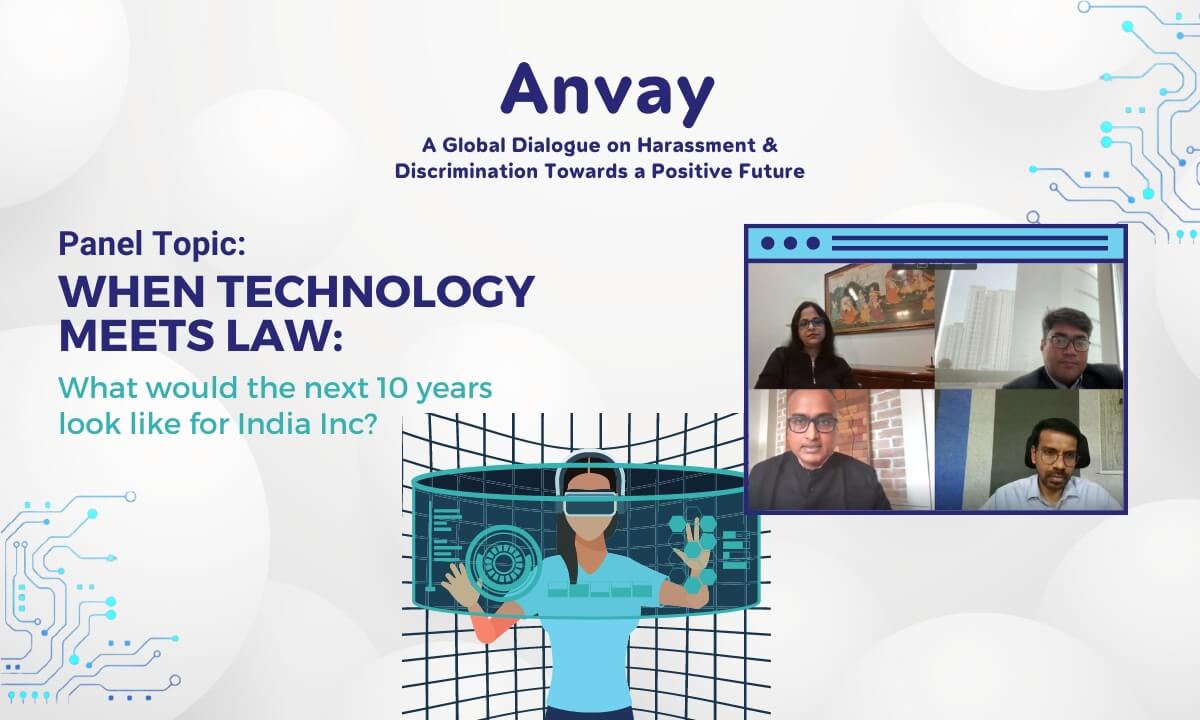At Anvay, one of the key panel discussions focused on the topic “When technology meets Law: What would the next 10 years look like for India Inc?”
The panel featured insightful contributions from:
- Vikas Mahendra, Co-Founder, Technology Enabled Resolution Partner, Keystone Partners Convenor, Indian Arbitration Forum South Asia Representative, ICC Young ADR and Arbitration Forum.
- Priyanka, COO, Manupatra.
- Ashish Aggarwal, Vice President and Head of Public Policy, NASSCOM.
- Anand Kumar, Lawyer, Founder & Managing Partner – Pier Counsel.
The intersection of technology and law is rapidly evolving, particularly in India, where both sectors are experiencing transformative changes. This panel discussion focuses on critical developments and explores how technology is poised to grow in the future.
Technology-Enabled Dispute Resolution
- Teres Initiative: Technology Enable Resolution System (Teres) aims at making dispute resolution more accessible and efficient. The system utilizes AI to transcribe court proceedings and facilitate online communication, ensuring confidentiality in international commercial arbitration.
- POCSO Code Design: Designing the Protection of Children from Sexual Offences (POCSO) code to ensure that victims feel safe during legal proceedings. This includes separate entrances and rooms for victims and perpetrators, highlighting the need for a comfortable environment.
- Online Dispute Resolution (ODR): The Security Exchange Board of India has mandated ODR for all security market transactions, indicating a significant shift toward technology-driven solutions in legal disputes.
Bridging Language and Accessibility Gaps
- Language Challenges: Emphasis on the importance of overcoming language barriers in legal processes, particularly for individuals from Tier 2 and Tier 3 cities. AI translation services are being utilized to enable people to file complaints in their local languages.
- Hub and Spoke Model: Where case managers act as intermediaries to help individuals navigate the legal system using technology. This approach aims to enhance participation in dispute resolution processes.
Technological Innovations in Legal Operations
- Case Management Tools: Several technological products are designed to streamline legal operations, including:
- MyCase: A case tracking tool that monitors cases across over 10,000 courts in India.
- ManuContract: A contract lifecycle management tool that centralizes contract information and renewal dates.
- ManuCompliant: A compliance management platform that keeps users updated on regulatory changes.
- AI in Legal Research: The discussion highlighted the increasing reliance on online legal research tools, which are becoming essential for lawyers and law firms.
- Virtual Court Enhancements: Incorporates technology like livestreaming court hearings and breakout rooms. Allows victims to attend hearings without direct interaction with perpetrators.
Future Trends and Challenges
- Adoption of Technology: While there is significant momentum towards adopting technology in legal processes, barriers remain—particularly among those uncomfortable with digital filing systems.
- E-Governance to Digital Governance: The government’s role in facilitating this transition through policies aimed at reducing friction in accessing courts.
- Cultural Adaptation: As technology evolves, there is a need for cultural adaptation within legal practices to fully leverage its benefits, particularly concerning privacy and data protection laws.
The integration of advanced technologies into legal frameworks promises to enhance accessibility, efficiency, and inclusivity in dispute resolution processes. Looking ahead, the potential for technology to further revolutionize the legal landscape is immense.
The journey toward a more technologically integrated legal system is not without its challenges, but the positive momentum generated by these discussions inspires optimism. Together, we can create a more equitable legal framework that harnesses the power of technology for the benefit of society as a whole.
Authored by – Gomathi Sridevi Radhakrishnan, Content Writer Intern, The Legal Swan.


